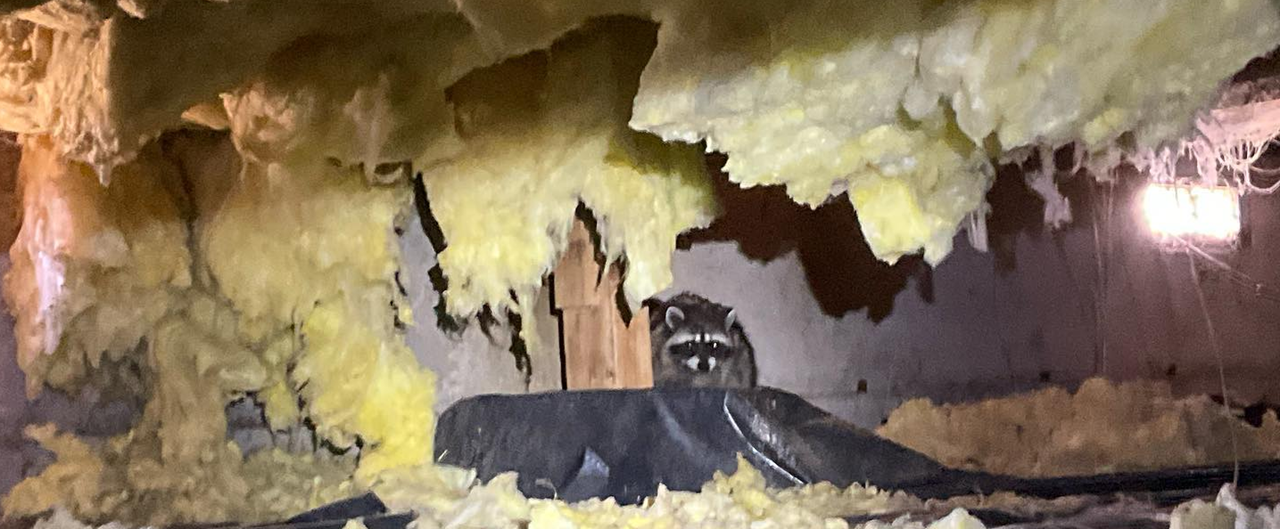
Need Help with Raccoon Infestation?
What Transmittable Diseases Do Raccoons Carry?
Raccoons can carry several diseases detrimental to the health of both humans and pets. Transmission is usually the result of incorrect handling of the pests, which leads to bites, scratches, or direct contact with raccoon feces. Here are a few of the most common diseases carried by raccoons:
- Rabies: Spread via saliva and causes muscle pain, dizziness, fatigue, loss of appetite, fever, delirium, and irritability.
- Raccoon Roundworm: Also known as baylisascaris, this parasite is found in the pest’s feces and induces unpleasant symptoms like liver enlargement, loss of muscle control, blindness, and disorientation.
- Leptospirosis: Bacteria spread via excrement which causes fever, headache, chills, muscle aches, jaundice, and potentially kidney or liver failure.
- Giardiasis: Gastrointestinal ailment that induces bloating, vomiting, indigestion, and loss of appetite in those afflicted.
- Salmonellosis: When ingested, the Salmonella bacteria brings about abdominal pain and diarrhea.
Raccoon populations often harbor a number of dangerous diseases and parasites that can easily be transmitted to humans who do not take proper precautions. Contact the wildlife experts at Critter Control to prevent the spread of disease and safely remove raccoons from your property.
Raccoons and Roundworm
The primary parasite carried by raccoons is the roundworm. Transmitted by eggs in the raccoon droppings, roundworms are inadvertently ingested when humans touch the feces, contaminated food, or polluted water sources and then touch their mouths. Young children are especially vulnerable to roundworms, which cause nausea, loss of muscle control, blindness, coma, and sometimes death.
Disease Prevention
Individuals should take precautions when they come in close contact with raccoons. To prevent the spread of disease:
- Parents should supervise outdoor play to reduce the chance of children contracting diseases.
- Always wash garden vegetables thoroughly to reduce the risk of consuming contaminated food.
- Never approach wild raccoons, especially if they are acting strangely, staggering about, or showing signs of aggression.
Contact a Professional Wildlife Expert
The safest course of action is to contact the wildlife experts at Critter Control, who are trained to handle problematic raccoons and protect residents from the dangerous diseases they spread.
Get them out.
Keep them out.®
Experiencing a wildlife or pest issue? We can help! Complete this form and your local Critter Control® office will contact you to assist.
Find a Critter Control near you.
- How to Get Rid of Raccoons
- Are Raccoons Dangerous?
- Raccoon Trapping Service
- Raccoon Control
- Baby Raccoons
- Dead Raccoon Removal
- Do Raccoons Hibernate in Winter?
- Raccoon Damage
- Raccoon Diet
- Raccoon Poop
- Raccoons In Yards
- Raccoons in Basements
- Raccoons in Chimneys
- Raccoons in Crawl Spaces
- Raccoons in Houses
- Raccoons in Trash
- Raccoons in Trees
- Raccoons in Walls
- Raccoons on Roofs & in Soffits
- Raccoon Sounds
- Raccoon Tracks
- Raccoons in Attics & Ceilings
- What Does a Raccoon Look Like?